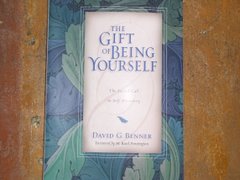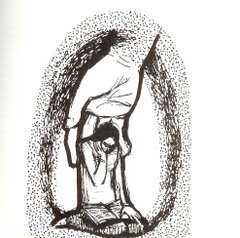Contemplative attentiveness
More often than we realize we see and hear something even in the most ordinary day....something that resonates deeply within us.....whether from our devotional reading or from the events and people around us. However, these insights are usually first assessed through our cognitive awareness. Moreover, this world we live in has become so fast paced that we are pulled in many directions at one time. We seldom have the space to allow the insights to become more fully part of us. I have practiced lectio divina for a number of years. I am grateful for the 'words' that resonate, that speak to me in the context of my life. But even one 'word' a day may be too much to process unless I intentionally return to it during the course of the day - which, of course in a busy life may be asking too much. So in fact this resonance may stay at the level of the mind. How can I allow it to move from the mind into the very heart...so that I live it in the very fabric of my being?
In other words, what does it mean to cultivate contemplative awareness as a quiet space within the self? To get beyond or beneath the chattering noisy self that acts and reacts to the external world out of a merely human perspective. Thomas Merton in his book "New Seeds of Contemplation" writes that "in contemplation we know by 'unknowing'. Or better, we know beyond all knowing". And "contemplation does not arrive at reality after a process of deduction, but by an intuitive awakening in which our free and personal reality becomes fully alive to its own existential depths, which open out into the mystery of God".
I am still in the process of unpacking (I intentionally do not use the word 'understand' because it leads me back to the controlling cognitive self that I may believe defines the whole of who I truly am) all this. By nature, I 'think' my way through life. In my schooldays, the challenge was to figure out mathematical problems and 'solve' them. Later on, it was trying to diagnose patients' illnesses (actually, medicine is as much an art as a science but that's another story). And more recently, to figure out different theological themes in Scripture. I enjoyed and continue to enjoy all of these (of course I have left the study of mathematics long ago!). These pursuits give me a sense of achievement, which I believe comes from the grateful use of God given talents. But they also give me a sense of being able to control my world....and when this is transferred into my spiritual life, I lose out on a dimension of knowing God that just cannot be obtained by the 'process of deduction'.
I am far from understanding all that Merton says about contemplative awareness. I only know that I am dissatisfied with my habitual ways of 'knowing'. They lead either to prideful control, when I think I have 'mastered' something or to despair when life seems resistant to my manipulations. In this early stage of my search, I have chosen (since three months ago) to spend an hour each day in 'silence' with the Lord. This is not for petitions or lectio or intercession...only to be quiet and perhaps to hear him. I have found that this spiritual discipline is first of all helping me 'hear' myself. It opens up my inner noise, my conflicting thoughts and my desire for control. Nothing estatic or other-worldly.....it merely serves to bring me down to earth (from my grasping mind) to the simple truth of my utter dependence on God. There are moments when everything quietens down, the false self has thought itself out....and I sense a peace that is beyond understanding.







+223.jpg)


























4 comments:
I agree with you that years of conventional education have made us too analytical and left-brained. It is imperative for us to learn a new way of receiving and learning. I find my greatest hindrance in this is impatience.
contemplative awareness is something I am learning too. Unfortunately, it is like something that once you get hold of it, it disappears. I learn most about awareness from my Buddhist friends.
Hi blogpastor! Welcome to this continuing journal about contemplative spirituality from an evangelical who is trying to 'listen with the heart'.I truly agree with you that impatience is a hindrance to new ways of receiving and learning. Indeed, we with the gift of quick brains find this also a 'burden' as we move into the realm of the Spirit. No wonder the Zen master told his eager student to just persist, and to just "chop wood and carry water".
Hi Alex, I am reminded of this quotation from Flannery O'Connor (The habit of being): "Belief has become an attempt to hang on to life, to grasp it and keep it for one's own. But you cannot understand life and its mysteries as long as you try to grasp it. Indeed, you cannot grasp it, just as you cannot walk off with a river in a bucket....To have running water you must let go of it and run. The same is true of life and of God."
Post a Comment